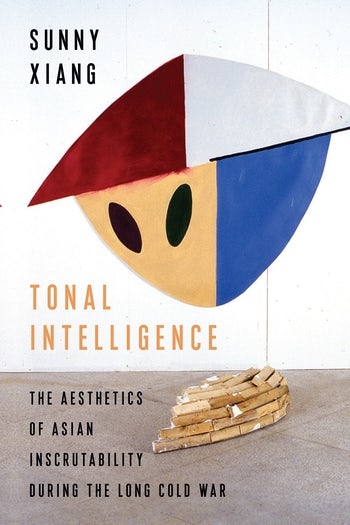Tonal Intelligence
The Aesthetics of Asian Inscrutability During the Long Cold War
Columbia University Press

Tonal Intelligence
The Aesthetics of Asian Inscrutability During the Long Cold War
Columbia University Press
Why were U.S. intelligence organizations so preoccupied with demystifying East and Southeast Asia during the mid-twentieth century? Sunny Xiang offers a new way of understanding the American cold war in Asia by tracing aesthetic manifestations of “Oriental inscrutability” across a wide range of texts. She examines how cold war regimes of suspicious thinking produced an ambiguity between “Oriental” enemies and Asian allies, contributing to the conflict’s status as both a “real war” and a “long peace.”
Xiang puts interrogation reports, policy memos, and field notes into conversation with novels, poems, documentaries, and mixed media work by artists such as Theresa Hak Kyung Cha, Kazuo Ishiguro, Ha Jin, and Trinh T. Minh-ha. She engages her archive through a reading practice centered on tone, juxtaposing Asian diasporans who appear similar in profile yet who differ in tone. Tonal Intelligence considers how the meaning of race, war, and empire came under pressure during two interlinked periods of geopolitical transition: American “nation-building” in East and Southeast Asia during the mid-twentieth century and Asian economic modernization during the late twentieth century. By reading both state records and aesthetic texts from these periods for their tone rather than their content, Xiang shows how bygone threats of Asian communism and emergent regimes of Asian capitalism have elicited distinct yet related anxieties about racial intelligibility. Featuring bold methods, unlikely archives, and acute close readings, Tonal Intelligence rethinks the marking and making of race during the long cold war.
Xiang puts interrogation reports, policy memos, and field notes into conversation with novels, poems, documentaries, and mixed media work by artists such as Theresa Hak Kyung Cha, Kazuo Ishiguro, Ha Jin, and Trinh T. Minh-ha. She engages her archive through a reading practice centered on tone, juxtaposing Asian diasporans who appear similar in profile yet who differ in tone. Tonal Intelligence considers how the meaning of race, war, and empire came under pressure during two interlinked periods of geopolitical transition: American “nation-building” in East and Southeast Asia during the mid-twentieth century and Asian economic modernization during the late twentieth century. By reading both state records and aesthetic texts from these periods for their tone rather than their content, Xiang shows how bygone threats of Asian communism and emergent regimes of Asian capitalism have elicited distinct yet related anxieties about racial intelligibility. Featuring bold methods, unlikely archives, and acute close readings, Tonal Intelligence rethinks the marking and making of race during the long cold war.
Tonal Intelligence is smart and theoretically sophisticated. The book marks a significant contribution to work in Asian American and Asian studies, studies of twentieth-century literature and culture, theories of form and affect, and transpacific studies of late twentieth-century Asia. Denise Cruz, author of Transpacific Femininities: The Making of the Modern Filipina
At once a profound meditation on method and archive and an important contribution to transpacific and Cold War studies, Tonal Intelligence boldly rethinks race and self-representation by theorizing tone as a way to read racial meaning. Xiang’s ambitious remit and strikingly original conceptualizations offer a powerful reconfiguration of aesthetics, affect, and the geopolitical. Jini Kim Watson, author of The New Asian City: Three-Dimensional Fictions of Space and Urban Form
Tonal Intelligence is an exceptional study of racial formation that tacks between the two ends of the Cold War. Its archive of critical sources is dazzling: Xiang engages and inhabits multiple critical fields and subfields, and she conveys her broad and deep bank of critical knowledge with ease and verve. Josephine Park, author of Cold War Friendships: Korea, Vietnam, and Asian American Literature
In Tonal Intelligence, Xiang’s achievement lies in how well she reads Asian inscrutability . . . her tonal analyses do much good in feeling out just how facile the rhetoric of racial essentialism truly is. Los Angeles Review of Books
Tonal Intelligence is remarkably effective in demonstrating what academics and practitioners can gain from reading the archives against the grain. Xiang succeeds in opening an important methodological door. Intelligence scholars should take note. International Journal of Intelligence and CounterIntelligence
Boldly grapples with the slipperiness of terminology about Asians and the inherent messiness of the cold war, pointing out many of the limits of our critical lenses. [. . .] Tonal Intelligence ought to serve as a model for scholars seeking to blend their archives seamlessly. American Literary History
A necessary challenge to current methods of studying the Cold War and a guide to interpreting archives of intelligence. H-War, H-Net Reviews
Acknowledgments
Introduction: Hardly War, Partly History
1. The Tone of Intelligence: Unconventional Warfare and Its Archives
2. The Tone of Rumors: Imperial Tours and Kazuo Ishiguro’s Critique of Japanese Exceptionalism
3. The Tone of the Times: Historical Temperament in the Works of Induk Pahk and Theresa Hak Kyung Cha
4. The Tone of Documentation: Combating the Brainwashee’s Drone in Korean War “Testimonies” and “Confessions”
5. The Tone of Intimacy: Imperial Brotherhood and Trinh T. Minh-ha’s Cinematic Interviews
Coda—the Tone of Commons: Solidarities Without a Solid
Notes
Bibliography
Index
Introduction: Hardly War, Partly History
1. The Tone of Intelligence: Unconventional Warfare and Its Archives
2. The Tone of Rumors: Imperial Tours and Kazuo Ishiguro’s Critique of Japanese Exceptionalism
3. The Tone of the Times: Historical Temperament in the Works of Induk Pahk and Theresa Hak Kyung Cha
4. The Tone of Documentation: Combating the Brainwashee’s Drone in Korean War “Testimonies” and “Confessions”
5. The Tone of Intimacy: Imperial Brotherhood and Trinh T. Minh-ha’s Cinematic Interviews
Coda—the Tone of Commons: Solidarities Without a Solid
Notes
Bibliography
Index
